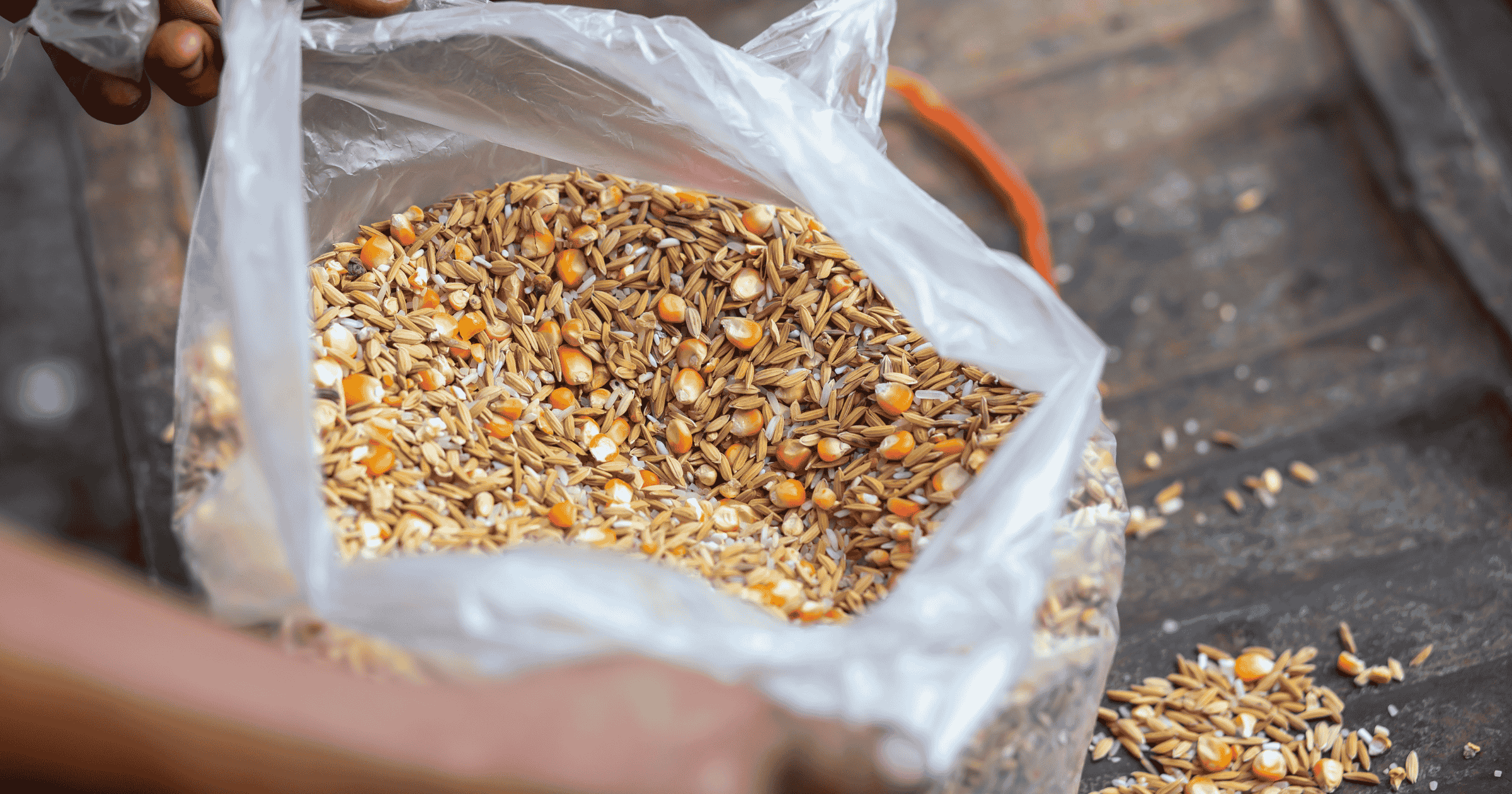
08 Apr Non-GMO Poultry Feed in Nigeria | Benefits and Sustainable Feeding Practices for Healthier Chickens
The poultry industry in Nigeria plays a pivotal role in providing high-quality protein through eggs and meat. However, the demand for healthier, more sustainable farming practices is growing, especially when it comes to poultry feed. Non-GMO poultry feed is emerging as a preferred option for many farmers who want to improve the health of their chickens while supporting more sustainable farming practices.
In this article, we’ll explore the benefits of using non-GMO poultry feed in Nigeria. We’ll discuss how it contributes to healthier chickens, better egg production, and a more sustainable agricultural system. If you’re a poultry farmer in Nigeria looking to enhance your farming practices, or a consumer interested in healthier food, read on to learn why non-GMO feed is the right choice.
What is Non-GMO Poultry Feed?
Non-GMO (Genetically Modified Organisms) poultry feed refers to feed that does not contain ingredients derived from genetically modified crops. This means that the feed is made from natural and unmodified ingredients such as grains, legumes, and other plant-based materials. Non-GMO feed is typically produced using traditional farming methods that focus on sustainable agriculture without the use of genetically engineered organisms.
Common ingredients found in non-GMO poultry feed include:
- Corn (from non-GMO sources)
- Soybeans (non-GMO)
- Wheat
- Barley
- Oats
- Rice bran
- Legumes
Non-GMO poultry feed is often free from synthetic chemicals, pesticides, and growth hormones that are commonly used in genetically modified crops. This makes it a more natural and healthier alternative for poultry farming.
Why Choose Non-GMO Poultry Feed in Nigeria?
As the demand for organic and sustainably sourced food grows globally, many Nigerian poultry farmers are making the shift to non-GMO feed for their chickens. Here are several reasons why non-GMO poultry feed is gaining popularity in Nigeria:
1. Healthier Chickens and Eggs
Chickens that are fed non-GMO feed tend to be healthier compared to those fed with GMO-based products. Non-GMO feed helps to improve the overall health of poultry by providing a diet that is rich in natural nutrients without harmful additives. Here’s how non-GMO feed contributes to healthier chickens:
- Better immune system: Non-GMO feed is free from the chemicals often used in genetically modified crops, which can negatively impact chicken health and their immune systems.
- More nutritious eggs: Eggs from chickens fed non-GMO feed often contain higher levels of essential nutrients like omega-3 fatty acids, vitamins, and antioxidants. These nutrients are beneficial to consumers and improve the overall quality of the eggs.
By feeding chickens non-GMO feed, farmers can produce healthier, more nutritious products that are better for both the animals and consumers.
2. Reduced Risk of Chemical Exposure
One of the key reasons farmers are opting for non-GMO feed is to avoid the risks associated with genetically modified crops. GMO crops are often treated with synthetic pesticides and herbicides, which can leave harmful residues in the feed. This could have negative effects on the chickens’ health and, ultimately, the quality of their eggs and meat.
Non-GMO feed, on the other hand, is less likely to contain harmful chemical residues. This reduces the risk of chemical contamination and ensures that chickens are fed a more natural and healthier diet.
3. Better Taste and Quality
Chickens raised on non-GMO feed often produce higher-quality eggs and meat. The natural ingredients in non-GMO feed contribute to better flavor and texture, making the products more appealing to consumers. Here’s how:
- Egg flavor: Non-GMO eggs are often described as having a richer, more robust flavor compared to eggs from chickens fed with GMO-based feed.
- Meat quality: Non-GMO-fed chickens tend to have tender, juicier meat, with a more natural taste that many consumers prefer.
As consumers become more health-conscious and environmentally aware, they are increasingly choosing non-GMO products for their superior quality and natural taste.
4. Sustainability and Environmental Impact
Choosing non-GMO poultry feed supports more sustainable farming practices that have less environmental impact. GMO crops require large amounts of water, synthetic fertilizers, and pesticides, which can contribute to soil degradation, water pollution, and loss of biodiversity. By choosing non-GMO feed, poultry farmers can reduce their reliance on industrial farming methods and adopt more eco-friendly practices.
Some ways in which non-GMO feed contributes to sustainability include:
- Support for local farmers: Many non-GMO feed suppliers work with local farmers to source grains and legumes, reducing the carbon footprint associated with transporting feed ingredients.
- Reduction of pesticide use: Non-GMO crops are often grown without the use of harmful pesticides and herbicides, which helps protect the environment and local ecosystems.
By switching to non-GMO feed, poultry farmers can contribute to a more sustainable agricultural system while producing food that is better for the environment.
5. Meeting Consumer Demand for Ethical Products
As Nigerian consumers become more conscious of the products they purchase, there is an increasing demand for ethical and sustainable food choices. By adopting non-GMO feed practices, poultry farmers can meet the growing consumer preference for natural, healthy, and sustainably produced food.
Farmers who choose to use non-GMO feed may find that they can charge a premium for their eggs and chicken meat, as consumers are willing to pay more for products that align with their values. This gives farmers an opportunity to cater to a niche market of conscious consumers who prioritize quality and sustainability.
How to Transition to Non-GMO Poultry Feed
For farmers who are interested in switching to non-GMO poultry feed, here are a few tips to help make the transition smooth:
1. Source Quality Non-GMO Feed Suppliers
Look for reputable non-GMO feed suppliers who provide high-quality, locally sourced ingredients. Many feed manufacturers in Nigeria now offer non-GMO options that are specifically designed for local poultry farming needs.
2. Gradual Transition
If you’ve been using GMO-based feed for some time, consider transitioning your chickens to non-GMO feed gradually. This will allow the birds to adjust to the new diet without sudden changes, which can cause digestive issues or stress.
3. Monitor Chicken Health and Egg Production
Keep track of the health and egg production of your flock after switching to non-GMO feed. Most farmers notice improved egg quality and chicken health within a few weeks of feeding non-GMO diets, but each farm may see different results depending on environmental conditions and flock size.
4. Educate Your Customers
Once you’ve switched to non-GMO feed, educate your customers about the benefits of the change. Highlight the health benefits of non-GMO eggs and meat, as well as the positive environmental impact of supporting sustainable farming practices.
Challenges of Non-GMO Poultry Feed in Nigeria
While the benefits of non-GMO feed are clear, there are a few challenges that farmers in Nigeria may face when making the switch:
- Cost: Non-GMO feed can sometimes be more expensive than conventional feed, which can impact farm profits. However, the long-term benefits of healthier chickens and higher-quality products may offset these costs.
- Availability: In some regions of Nigeria, non-GMO feed may not be as readily available as traditional feed, making sourcing more difficult.
- Consumer Education: As non-GMO feed is still a relatively new concept for some Nigerian consumers, educating the market about the benefits of non-GMO poultry products may require extra effort.
Conclusion: Why Non-GMO Poultry Feed is the Future of Farming in Nigeria
The adoption of non-GMO poultry feed in Nigeria is not just a trend—it’s a sustainable, healthier, and ethical choice that benefits both farmers and consumers. By feeding chickens natural, non-GMO diets, farmers can improve the health of their flocks, produce better-quality eggs and meat, and contribute to more sustainable agricultural practices.
As consumer demand for ethical, sustainable products continues to grow, the future of poultry farming in Nigeria lies in adopting practices like non-GMO feed. By making the switch, Nigerian poultry farmers can set themselves apart, offering consumers high-quality, healthy, and environmentally friendly products.
Are you ready to switch to non-GMO poultry feed? Share your thoughts and experiences in the comments below!
Recent posts
- How to Make Akara and Moi Moi with Farm Eggs | Delicious Nigerian Recipes
- How to Make Perfect Omelettes with Farm Eggs | Easy, Delicious Recipe
- Easy Egg Salad Recipes with Farm Fresh Eggs | Delicious & Nutritious
- Deviled Eggs with Local Nigerian Ingredients | Easy Recipe
- Delicious Nigerian Dishes Made with Eggs | Tasty Egg Recipes
Your cart
Your cart is currently empty!








No Comments